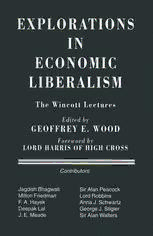
Explorations in Economic Liberalism: The Wincott Lectures PDF
Preview Explorations in Economic Liberalism: The Wincott Lectures
EXPLORATIONS IN ECONOMIC LIBERALISM ALsoby GeoffreyE. Wood FINANCIALCRISES AND THE WORLD BANKINGSYSTEM (editor with Forrest Capie) MACROECONOMICPOLICYAND ECONOMIC INTERDEPENDENCE(editor withDonaLdR.Hodgman) MONETARY AND EXCHANGERATEPOLICY (editor with DonaLd R. Hodgman) MONETARY ECONOMICS INTHE 1980s(editor with ForrestCapie) UNREGULATEDBANKING: CHAOS ORORDER?(editor with ForrestCapie) Explorations in Economic Liberalism The Wincott Lectures Edited by Geoffrey E. Wood City University BusinessSchool London Forewordby Lord Harris ofHigh Cross FirstpublishedinGreatBritain1996by MACMILLANPRESSLTD Houndmills, Basingstoke,HampshireRG216XS andLondon Companiesandrepresentatives throughouttheworld Acataloguerecordforthisbook isavailable fromtheBritishLibrary. ISBN 978-1-349-24969-5 ISBN 978-1-349-24967-1 (eBook) DOI 10.1007/978-1-349-24967-1 FirstpublishedintheUnitedStatesofAmerica 1996by ST.MARTIN'SPRESS,INC., Scholarly andReferenceDivision, 175FifthAvenue, NewYork,N.Y.10010 ISBN978-0-312-15997-9 LibraryofCongress Cataloging-in-PublicationData Explorations ineconomicliberalism:theWincottlecturesIeditedby Geoffrey E.Wood. p. cm. Includesbibliographicalreferencesandindex. ISBN 978-0-312-15997-9 I.Freeenterprise. 2.Wincott,Harold. I. Wincott, Harold. 11.Wood,Geoffrey Edward. HB95.E97 1996 330.12'2--dc20 9S--53930 CIP ©TheWincottFoundation 1996 Softcoverreprintofthehardcover1stedition1996 Allrightsreserved. Noreproduction,copyortransmissionof thispublicationmaybemadewithout writtenpennission. Noparagraphofthispublication maybereproduced,copiedor transmittedsavewithwrittenpennissionorinaccordance with theprovisionsoftheCopyright, DesignsandPatentsAct1988, orunderthetermsofanylicence permittinglimitedcopying issuedbytheCopyright LicensingAgency,90TottenhamCourt Road,LondonWIP9HE. Anypersonwhodoesanyunauthorisedactinrelationtothis publication maybeliabletocriminalprosecutionandcivil claimsfordamages. 10 9 8 7 6 5 4 3 2 I 05 04 03 02 0I 00 99 98 97 96 Contents Foreword by Lord Harris ofHigh Cross IX Notes on the Contributors xii Introduction by Geoffrey E. Wood xv Foreword by Lord Robbins to Chapter 1 The Counter-Revolution in Monetary Theory 3 Milton Friedman Irving Fisher and the Quantity Theory 4 The Keynesian Revolution 6 The Counter-Revolution 10 Key Propositions of Monetarism 16 Concluding Cautions 19 2 Wages and Prices in a Mixed Economy 22 J. E. Meade Introduction 22 Inflation: 'Anticipated' and 'Explosive' 22 Conditions for Full Employment without Inflation 25 Recent Changes in the Labour Market 28 Proposals for Restraining 'Explosive' Wage Inflation 31 Supply and Demand in the Labour Market 35 A Critical Look at the Proposals 39 Bringing Profits and Prices into the Net 42 Free Imports Most Effective Weapon 44 Note on the Measurement of Influences 45 Affecting the Allocation of Labour 3 Economic Freedom and Representative Government 50 F. A. Hayek The Seeds of Destruction 50 The Danger of Unlimited Government 52 The Fundamental Principle 54 The Separation of Powers 57 v VI Contents Advantages of Legislative Separation 62 4 Aspects of Postwar Economic Policy 64 Lord Robbins Introduction 64 A General Perspective 64 The Burden of Taxation 66 Incentives, Saving and Investment 67 Industrial Policy 69 Restrictive Practices 70 Growth and Inflation 73 .Causes of Inflation 75 The Remedy 79 5 The Credibility of Liberal Economics 82 Sir Alan Peacock The Task. 82 The Background 84 The Supply of Liberal Political Economy 88 The Emotional Resistance to Liberal Political Economy 91 'The Intellectual Occasions of Hesitancy' 94 Retaining and Expanding Credibility 97 6 Economists and the British Economy 103 Sir Alan Walters A Reminiscence 103 Lessons of Macro-Economic Management 104 Monetarism 1970 106 Consumption and Savings in the 1970s 108 The Discrediting of 'New Cambridge' 110 The Counter-Revolution in Expectations 112 Cost-Push and Expansionism 115 Expansionism and the Role of Money 119 Conclusion 120 7 The Pleasures and Pains of Modern Capitalism 126 George J. Stigler The Pleasures 126 The Pains 132 Contents vii The Balance of Pleasures and Pains 135 The Outlook for Capitalism 137 8 The Limits of International Cooperation 141 Deepak Lal Introduction \4\ International Co-operation to Maintain Free Trading and Payments Systems 141 The Theoretical Case for International Dirigisme 143 International Macro-economic and Exchange Rate Coordination 145 International Environmental Externalities 152 The Greenhouse Effect 154 The Ozone Layer 160 Conclusions 164 9 Do Currency Boards Have a Future? 172 Anna 1. Schwartz Introduction 172 What is a Currency Board? 172 Abandonment of the Currency Board System 175 Present-Day Currency Boards 177 Are Currency Boards the Wave of the Future? 179 Conclusion 182 10 Free Trade, 'Fairness' and the New Protectionism 186 Jagdish Bhagwati Introduction \86 The WTO: The Main Agenda 187 Regionalism versus Multilateralism or FTAs versus FT 205 The WTO: Architecture, Not Engineering 210 Index 214 Harold Wincott Foreword: Harold Wincott - Doyen of Financial Joumalism Ralph Harris I am not hopeful of conveying fully to a younger generation the en during place Harold Wineott earned in the postwar transformation of financial journalism. When I took up economics at Cambridge in 1945, few people outside the Square Mile and perhaps the financial com munities scattered around the provinces made a habit of poring over the acres of anonymous, densely packed, columns headed 'City Edi tor', 'Financial Editor' or 'Our Own Correspondent'.A real scoop might justify 'from our special correspondent'. By 1957, when the Institute of Economic Affairs set'up its first of fice behind Throgmorton Street, some of the anonymity was being shed. In the next decade I had the good fortune to meet a veritable academy of City journalists withnames already winning wide recognition among businessmen, politicians and even professional economists. Among the most celebrated in their day were Oscar Hobson, Paul Bareau, Manning Dacey, Richard Fry, Wilfred King, Maurice Green, followed later by William Clarke,Andrew Shonfield, Patrick Hutber, Nigel Lawson, Peter Jay, Christopher Fildes, and, of course, the everlasting Samuel Brittan. All of them shared a serious, even scholarly approach to the interpre tation of current affairs. And with few exceptions, they also shared a broad commitment to market economy learned from close observation of the real world. I believe none of these famous names would begrudge pride of place to Harold Wincott. Certainly, by the time of his death in 1969 at the age of 62, his weekly articles in The Financial Times had become some thing of a national institution. Unique among such a galaxy, this pre-emi nence was achieved without the least claim to formal study, let alone universityeducation.Indeed,hisapprenticeshipwasaltogethermorepractical. Born in North London in 1906, he left Hornsey County School at 16. His father wanted him to go into the small family business of heraldic ix
